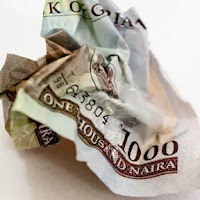A liquidity squeeze refers to a situation where there is a shortage of available cash or easily convertible assets in the financial system of a country. This can happen when banks, businesses, or investors struggle to access funds due to tight monetary policies, rising interest rates, or reduced lending by financial institutions.
In this context, a liquidity squeeze means that there isn't enough cash circulating in the economic system of a country. This makes it harder for investors to buy Nigerian Treasury bills. Meanwhile, it's important to note that this drop in demand for government securities could be caused by government borrowing crowding out private sector access to funds (i.e., banks prefer to lend to the government instead of businesses).
However, the Central Bank of Nigeria (CBN) was trying to address this issue in a recent unexpected move, where the apex bank added an extra auction to its calendar, during which yields on one-year T-bills rose to 24.90% from 22.52%. This increase resulted in a positive real return of 1.72%, the first since May 2020.
Despite the CBN's efforts, the latest auction saw a significant drop in demand. People bought far fewer Treasury bills than before. The total amount bought was ₦861 billion, which is the lowest this year. Earlier in 2024, at the first auction, people bought ₦1.5 trillion worth of Treasury bills. This drop in demand happened even though the government was offering ₦800 billion worth of bills, which was the biggest offer since February 2024.
Experts say the low demand for Treasury bills is because there isn’t enough money available in the economic system.
A research expert, Tajudeen Ibrahim, explained that local investors rely on how much cash is flowing in the system, while foreign investors prefer a different type of government security called Open Market Operation bills (OMO bills). He also pointed out that the one-year Treasury bill now has a high return of over 24%, making it a good investment for foreign investors, especially since global interest rates have stayed the same.
To fill a ₦800 billion gap in its borrowing plans, the Central Bank of Nigeria (CBN) held an extra auction. Another expert, Matilda Adefalujo, agreed that low money supply was the main reason demand dropped. She also said the extra auction was meant to remind investors that T-bills are still a great investment and to raise funds before interest rates possibly drop in May.
Earlier in the year, foreign banks were optimistic about Nigeria’s T-bills. J.P. Morgan, a big global bank, said it still sees Nigerian T-bills as a good investment because of ongoing economic reforms, but it’s also keeping an eye on the Naira’s value.
In summary, despite the CBN's efforts to make T-bills more attractive by raising yields, a liquidity squeeze in the financial system has led to a significant drop in demand for these securities.
How a Liquidity Squeeze Affects Nigerian Treasury Bills (T-bills)?
In the simplest terms, we can define Nigerian Treasury bills (T-bills) as short-term government securities used for raising funds. Investors ( such as banks, institutions, and individuals) buy them, expecting returns. However, when a liquidity squeeze occurs;
- It reduces the demand for the T-bills,
- To attract investors, the CBN raises interest rates on T-bills, making them more appealing,
- and also impact on government borrowing and the economy in the sense that the government may struggle to raise enough money through T-bill sales. If investors don’t buy enough T-bills, the CBN may have to borrow at even higher rates, increasing the country’s debt servicing costs.
In conclusion, a liquidity squeeze limits the cash available for investments, reducing demand for Nigerian T-bills. This forces the CBN to increase yields, making T-bills more attractive to investors but also increasing borrowing costs for the government. A prolonged liquidity squeeze can slow down economic growth, as businesses also struggle to get loans. If this continues in this manner, it could harm Nigeria’s fiscal stability and economic growth.


